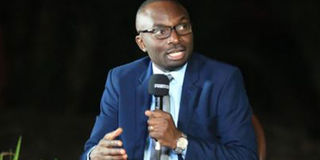Tokyo Games: Bombers’ medal-less display poses questions as mental health issues come into focus

Author: Robert Madoi is a sports journalist and analyst. PHOTO/FILE/NMG.
What you need to know:
- Suits in the boardrooms remain the Achilles hells in the fate of sports
Anyone on chef duties in a place that without calling itself a restaurant does a good impersonation of one will tell you two things. First off, it’s conceivable that you will be told to allocate some time to the visual elements of food presentation. The proof of the pudding, though, will always be in the eating. A question might be belligerently posed at this junction: Where am I going on with this food metaphor?
If you watched last Friday’s Olympics opening ceremony, you must have come to the conclusion that Team Uganda’s entourage was soft on the eye. But stripped of their garb and pared to their most elemental dimensions in the ring and water, Team Uganda’s athletes mostly came off as drearily routine. Before proceeding, your columnist wishes to be clear that his objective here is not to cast judgment on athletes who stretched every sinew in their body to get to the big time.
If anything, I’m stronger than ever in the conviction that suits in boardrooms remain the Achilles heel. These suits continue to cling on to an ideology that is at odds with well-established and widespread beliefs. Countries worth the salt usually, in time-honoured fashion, allocate more urgency and resources to Olympic disciplines where a competitive advantage is readily identifiable. The operative word being ‘more’. While diversification is embraced in these countries, a skew is clearly seen or understood.
Suits in Uganda have evolved only negligibly in their abilities to make the most of competitive advantages. At the time of writing this column, boxing still had the distinction of being Uganda’s most successful Olympic discipline. Four of the country’s seven medals [and counting] have come from the ring. The last of those four medals, however, came at the 1980 Games when John ‘The Beast’ Mugabi worked feverishly for his silver in Moscow, Russia. Despite or in fact because of David Ssemujju’s remarkable sprint into the ring and Shadir Bwogi’s trademark lunging punches, Ugandan boxers will leave Tokyo 2020 medal-less.
There is a backstory to this display, and it’s couched in preparation. Or, more accurately, the dearth of it. The suits will attempt to cover up inconvenient efforts that do not align with their version of reality, but the proverbial writing is on the wall. It beggars belief that our boxers weren’t part of the training camp the International Boxing Association (Aiba) organised in the Russian city of Khabarovsk!
Younes Nemouchi, the Algerian who eliminated Ssemujju, sharpened his skillset in Khabarovsk early this month as the Bombers waited anxiously for their coach, Patrick Lihanda, to return a negative Covid test. Talent is no longer a silver bullet; you also ought to be intentional in spreading out preparations over a protracted period. Short of that, you will serve undercooked chicken drumsticks that no mastery of plating can mask.
*****************
As I was typing this column, a tweet from Uganda Swimming Federation’s (USF) official account caught my attention. Daily Monitor’s back page that pictured Bwogi taking a punch to the face accompanied by the headline: “Empty Bombers to the drawing board” was juxtaposed with a photo of a Japanese wishing athletes at Tokyo 2020 every good fortune. The fan displayed a placard that simply read: “Good Morning Athletes! Even if you don’t get a medal, you’re still the BEST!! So believe in yourself”!!
Just in case the message had been missed, with right pointing backhand index emoji directed at the back page, USF wrote: “Let us kindly show empathy to our athletes. We can be more positive in our reporting”.
In the recent past, star athletes Naomi Osaka and Simone Biles have shown tremendous courage in acknowledging their vulnerabilities. There has consequently been something of a reckoning with the media – both legacy and social – not escaping responsibility in holding star athletes to goals that are wildly ambitious in scope and reach. Osaka has particularly forced the media to have a conversation about whether the press conference format needs to be tweaked.
This column strongly believes that journalism’s jurisdictional claim to holding officials and athletes accountable serves great purpose if it’s well intentioned.
There are ethical mandates and editorial oversight that ensure we don’t cross a Rubicon. USF is right in stating that “it’s tough being an athlete in [Uganda]”! And, yes, “there’s too many things working against the athlete”. Mindful of this, I always push journalists entrusted to my care to fully establish facts before running with a story. I also encourage sensitive reporting. All told, public scrutiny will always be journalism’s calling card. The tone we should embrace should sit between tough love and constructive criticism.
Email: [email protected]
Twitter: @robertmadoi




